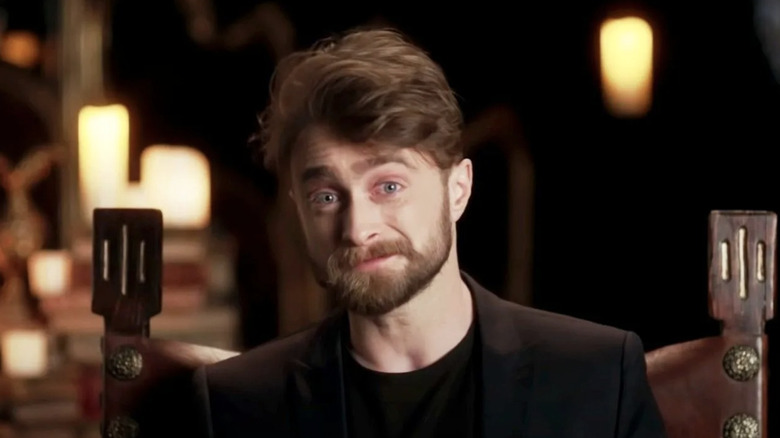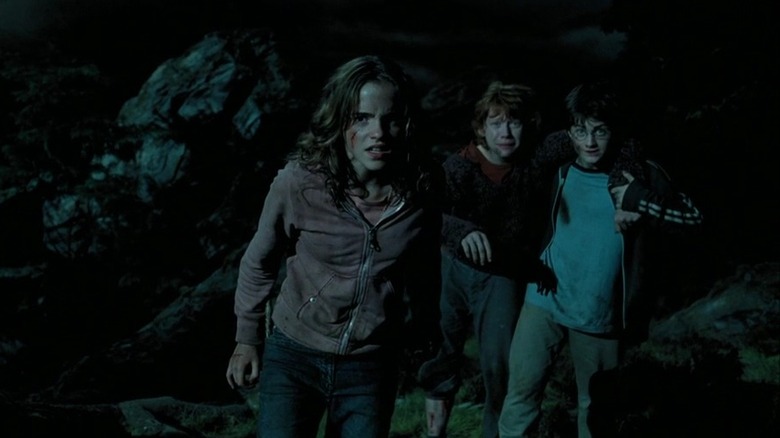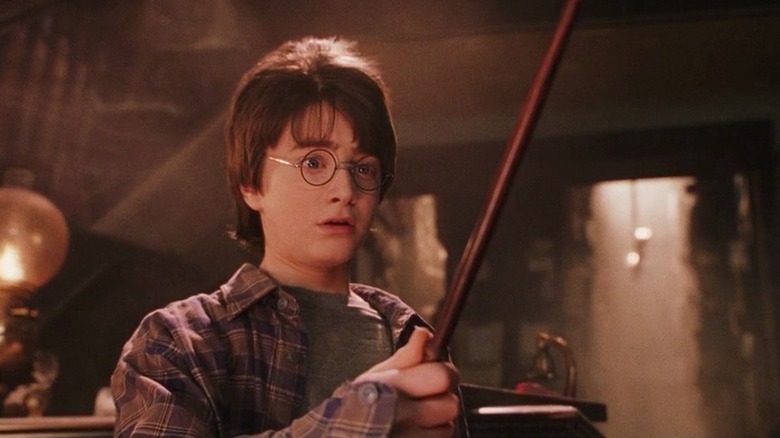Why Daniel Radcliffe Had To Speak Out Against J.K. Rowling In His 2020 Open Letter
Throughout 2020, J.K. Rowling, creator of the beloved "Harry Potter" children's franchise, chose the height of the COVID-19 pandemic for a transphobic soapbox. Though the author had expressed her TERF (Trans Exclusionary Radical Feminist) stances before on Twitter, Rowling took to her blog with a 3,670 word essay, which was full of dangerous misconceptions about trans identity, logical fallacies, and blatant hatespeech. Deflecting any criticism under the guise of "cancel culture," Rowling's letter unfortunately amplified the voices of her bigoted community of TERFs, going full mask off with her transmisogynistic ideology.
On June 8, 2020, Daniel Radcliffe, the titular "Harry Potter" star himself, teamed up with The Trevor Project to publish an open letter of his own in response to Rowling's anti-trans vitriol. Radcliffe perfectly expressed that while Rowling is "unquestionably" the reason why he has his celebrity status, he felt a compelling responsibility to speak out and express his support for the trans community. "Transgender women are women," Radcliffe proudly proclaimed, leading into resources that helped explained the differences between sex and gender, and how best to support the trans and nonbinary community.
In a new interview with IndieWire for his Roku original film, "Weird: The Al Yankovic Story," Radcliffe continued to open up on why, despite a potential media backlash, he decided to speak out against the billionaire author whom he owes his success to.
'I wanted them to know that not everybody in the franchise felt that way'
"The reason I felt very, very much as though I needed to say something when I did was because, particularly since finishing "Potter," I've met so many queer and trans kids and young people who had a huge amount of identification with Potter on that," Radcliffe said. "And so seeing them hurt on that day I was like, I wanted them to know that not everybody in the franchise felt that way. And that was really important."
"Harry Potter" ultimately captured the hearts of many because of its relatable characters and fantastical world, but crucially, it's a story of found families who unite together in the face of oppression. These are themes that often resonate with LGBTQ+ audiences, especially queer youth, who often look to media for comfort in phases of their life where they are not ready to come out. Radcliffe's sentiments are validating towards those who have ever identified with his character and are now threatened by Rowling's worldview. As a longtime collaborator with the Trevor Project, he felt it wasn't something he could stay silent on.
"It was really important as I've worked with the Trevor Project for more than 10 years, and so I don't think I would've been able to look myself in the mirror had I not said anything," Radcliffe admits. "But it's not mine to guess what's going on in someone else's head."
Radcliffe believes art belongs to the audience
Sometimes doing the right thing is difficult. As a former child star, Radcliffe has had a lot of experience with the way the press cycle works and how they can scrutinize a public figure's words and actions. Thankfully, he knew it was important to break the silence and understands that the protection of trans and nonbinary people and their identity is more worthwhile. Though many of his co-stars share his sentiments, Radcliffe, as the face of "Potter" himself, made a lot of impact with his open letter.
We echo Radcliffe's conclusion from his original 2020 open letter, as it eloquently states the sacred bond between art and the audience:
"To all the people who now feel that their experience of the books has been tarnished or diminished, I am deeply sorry for the pain these comments have caused you. I really hope that you don't entirely lose what was valuable in these stories to you. If these books taught you that love is the strongest force in the universe, capable of overcoming anything; if they taught you that strength is found in diversity, and that dogmatic ideas of pureness lead to the oppression of vulnerable groups; if you believe that a particular character is trans, nonbinary, or gender fluid, or that they are gay or bisexual; if you found anything in these stories that resonated with you and helped you at any time in your life — then that is between you and the book that you read, and it is sacred. And in my opinion nobody can touch that. It means to you what it means to you and I hope that these comments will not taint that too much."


